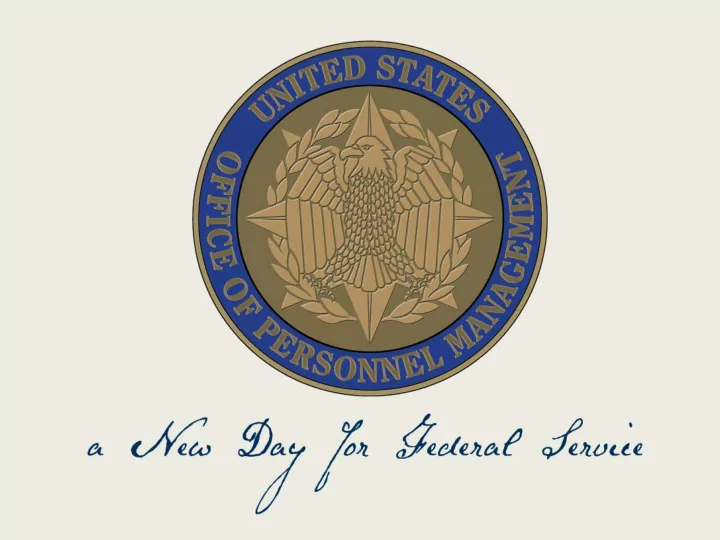

Washington, DC, Area Dismissal and Closure Procedures 2014-2015 Winter Season
Overview • The Washington, DC, Area Dismissal and Closure Procedures (Procedures) are used in situations that prevent significant numbers of Federal employees from – Reporting to the office on time Remaining at the office for the entire workday, or Reporting to the office for the entire workday • Examples would include severe weather conditions, natural disasters, and other special events
Overview (continued) • The Procedures are designed to promote continuity of operations without compromising the safety of Federal employees and the general public. • The Procedures cover Executive branch agencies within the “Capital Beltway”. • Agencies located outside of the Capital Beltway may decide to develop separate plans for their facilities, as they may be subject to different weather and traffic condition.
2014-2015 Procedure Highlights The U.S. Office of Personnel Management (OPM) reminds Federal agencies and employees on — Importance of Following OPM Operating Status Announcements Encourages Telework Policies and Procedures Communication of Expectations One update— Employees on Pre-Approved Paid Leave When Federal Offices Are Closed
Importance of Following OPM Operating Status Announcements • Since the early 1980’s, the Director of OPM has made the final decision on the Federal Government’s operating status in the Washington, DC, area in the event of area-wide work disruptions. • Agencies should avoid independent action because changes in the commuting hours of Federal employees can result in dramatic disruption of the highway and mass transit systems.
Importance of Following OPM Operating Status Announcements (continued) Following OPM ’ s operating status announcements and policies will— Allow for coordination with municipal and regional officials Promote safety of employees and the general public Reduce disruption of the highway and transit systems Ensure that affected employees are treated as consistently as possible.
Agency Specific Emergencies • Agencies have the authority to act on agency- specific emergencies and should not wait for OPM to make or update announcements—e.g. flood, power outage, building fire. • Agencies are in the best position to determine the appropriate course of action for an agency- specific emergency. • Each agency should have a method for communicating and updating operating status announcements that affect only their agency.
Telework Policies and Procedures • The Telework Enhancement Act requires agencies to incorporate telework into their Continuity of Operation Plans (COOP). • OPM advises agencies to make telework a standard part of all agency emergency planning to ensure the Government is well positioned to carry out its essential functions for COOP. • To support the Act, OPM incorporated “unscheduled telework” into it’s operating Procedures. • As a result “unscheduled telework” is now a standard human resources tool.
Telework Policies and Procedures (continued) • To ensure telework is incorporated into their emergency procedures, agencies should— Encourage employees to enter into written telework agreements, as appropriate Communicate expectations before the emergency situation occurs Practice and test equipment and procedures regularly throughout the year. • Having telework arrangements in place allows a greater number of employees to work during emergency situation without compromising their safety.
Telework Policies and Procedures (continued) • For continuity of operations purposes, agencies should be taking steps to require employees who are telework-ready to telework during days when the Federal offices are closed. • This migration will support the Act, maintain productivity during closures, and keep our employees safe.
Communication of Expectations • OPM’s operating status announcements are only effective if each supervisor and employee understands what the announcements mean and how to react. • Agencies must update their internal policies, including COOP plans and telework agreements to reflect employee requirements under emergency operating procedures. • Employees must understand and be able to act immediately under their own agency’s procedures and collective bargaining agreements.
Communication of Expectations (continued) • Agencies must provide clear guidance on human resources flexibilities that are available to employees during specific agency operating procedures Unscheduled Telework/Unscheduled Leave Leave without pay Alternative Work Schedule Day Off
Employees on Pre-Approved Paid Leave When Federal Offices Are Closed • In the past, employees automatically received excused absence if they were on pre-approved paid leave when Federal offices were “Closed.” • Since 2010, OPM has strongly encouraged agencies to require telework-ready employees to telework on days that Federal offices are closed. • Since many employee are now required to telework on closure days, OPM believes the pre-approved leave policy has become outdated and does not reflect the new realities of the 21 st century.
Employees on Pre-Approved Paid Leave When Federal Offices Are Closed (continued) OPM’s procedures will no longer advise agencies to • cancel an employee’s pre-approved paid leave and automatically grant the employee excused absence on a day when Federal offices are closed. Employee will be permitted to cancel leave subject to • agency policy in accordance with any applicable collective bargaining agreements or requirements (as consistent with law). For example an agency-- may allow an employee with a telework agreement to cancel annual leave to perform telework. must cancel sick leave for a medical procedure that was canceled due to the same weather emergency
Washington, DC, Area Operating Status Announcements OPEN • OPEN WITH OPTION FOR UNSCHEDULED LEAVE • OR UNSCHEDULED TELEWORK OPEN – XX HOUR(S) DELAYED ARRIVAL – WITH • OPTION FOR UNSCHEDULED LEAVE OR UNSCHEDULED TELEWORK OPEN – DELAYED ARRIVAL – EMPLOYEES MUST • REPORT TO THEIR OFFICE NO LATER THAN XX:XX – WITH OPTION FOR UNSCHEDULED LEAVE OR UNSCHEDULED TELEWORK
Washington, DC, Area Operating Status Announcements (continued) OPEN – XX HOUR(S) STAGGERED EARLY • DEPARTURE OPEN - XX HOUR(S) STAGGERED EARLY • DEPARTURE – ALL EMPLOYEES MUST DEPART NO LATER THAN XX: XX AT WHICH TIME FEDERAL OFFICES ARE CLOSED IMMEDIATE DEPARTURE – FEDERAL OFFICES • ARE CLOSED FEDERAL OFFICES ARE CLOSED – EMERGENCY • AND TELEWORK-READY EMPLOYEES MUST FOLLOW THEIR AGENCY ’ S POLICIES SHELTER-IN-PLACE •
Questions ? • The updated version of the Procedures is available now at http://www.opm.gov/policy- data-oversight/pay-leave/reference- materials/handbooks/dcdismissal.pdf • Additional questions concerning the Procedures may be sent via email to pay-leave- policy@opm.gov
Recommend
More recommend